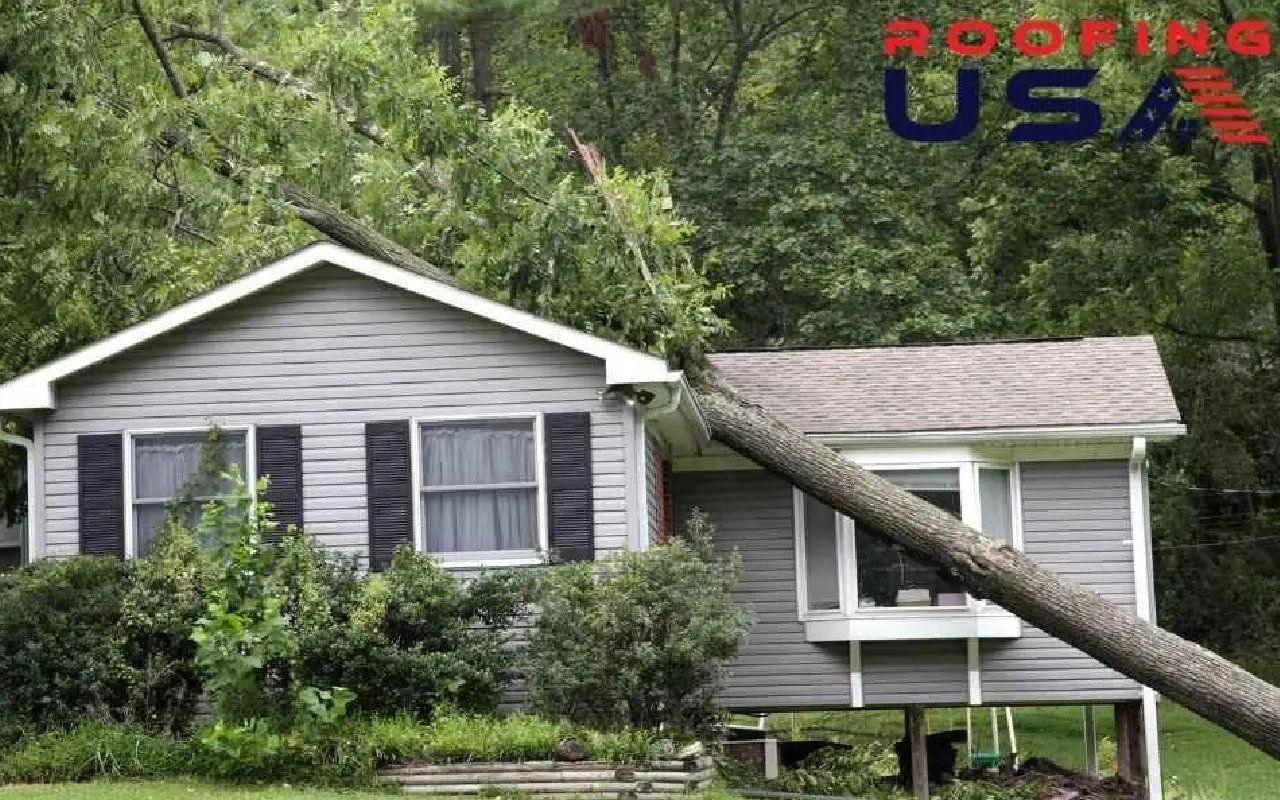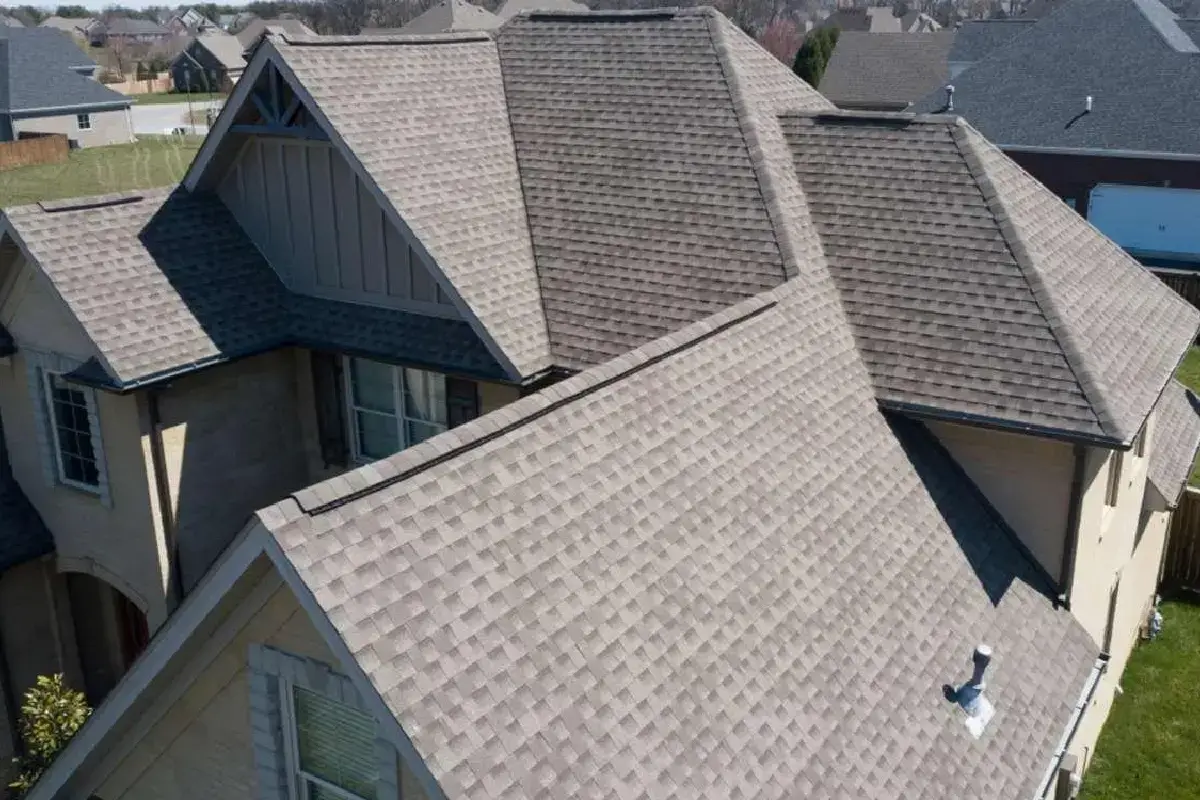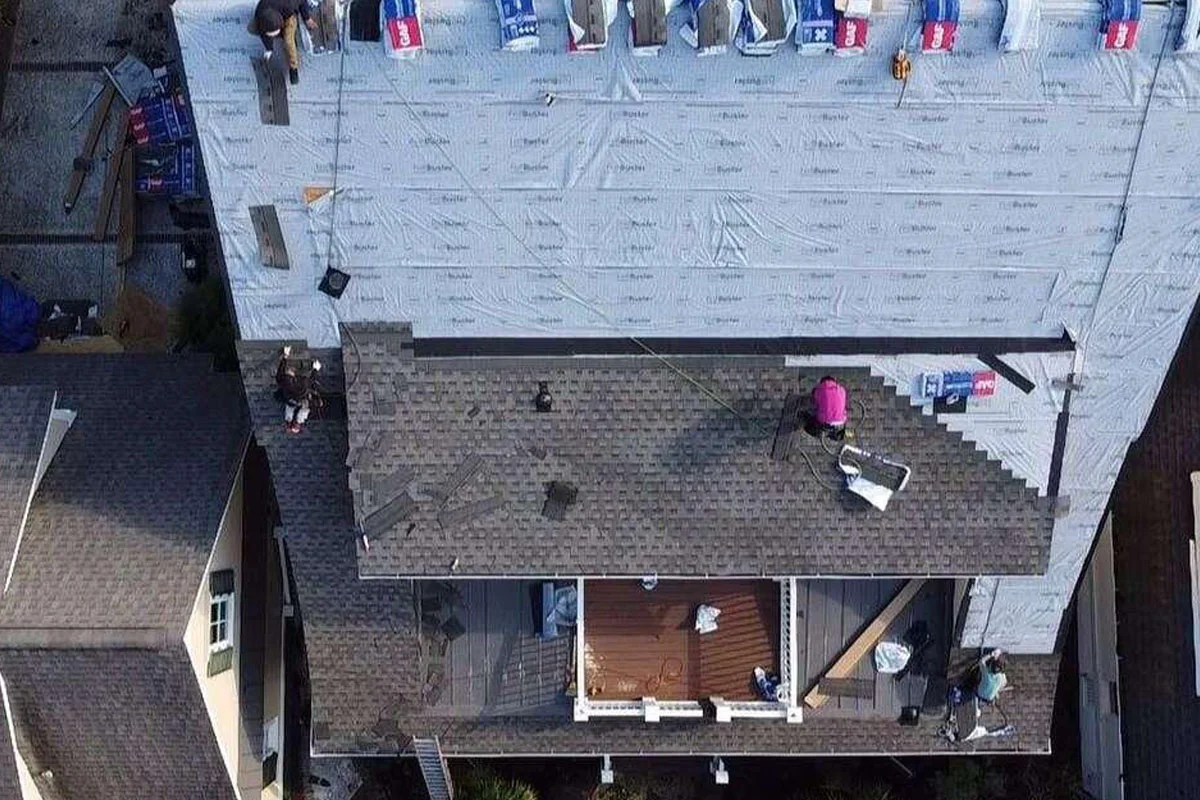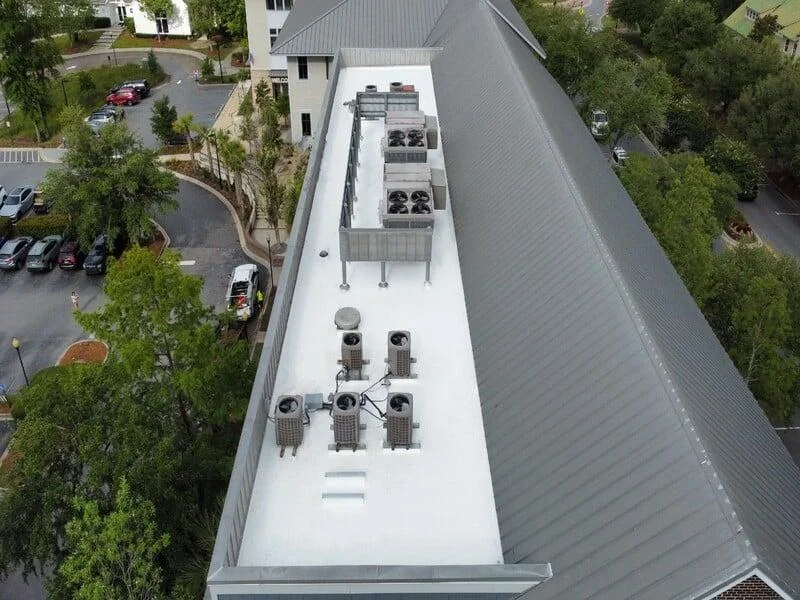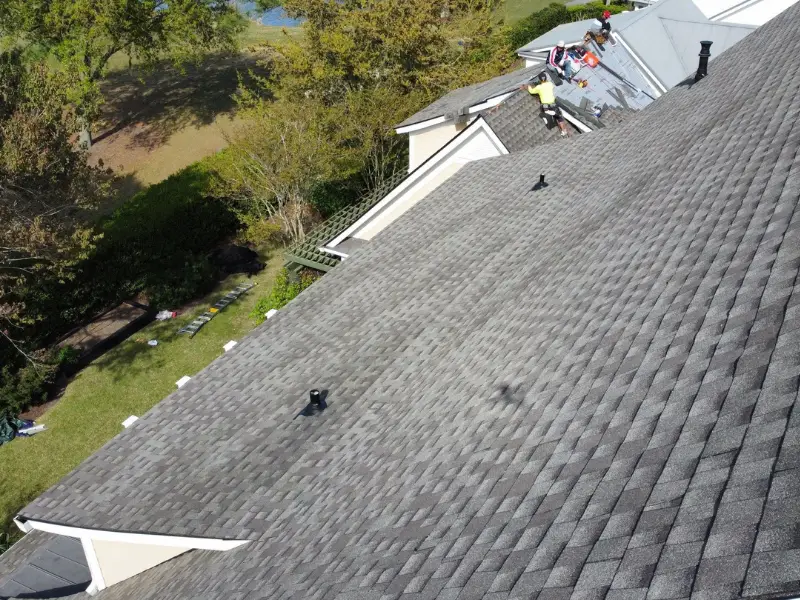For commercial buildings, the importance of a well-maintained roof cannot be overstated. A sturdy and reliable commercial roofing system is the first line of defense against the elements, protecting the valuable assets housed within the structure. For commercial building owners, understanding the intricacies of different roofing options is essential for making informed decisions that will stand the test of time. One such roofing solution that has garnered significant attention is modified bitumen roofing. This article will serve as a comprehensive guide from your modified bitumen roofing experts here at Roofing USA, taking you through everything you need to know about this versatile roofing system. So, keep reading to be equipped with the knowledge to make sound choices for your commercial property.
An Overview of Modified Bitumen Roofing
Now that we understand the significance of roofing in commercial buildings let’s discuss modified bitumen roofing. This type of roofing system combines the inherent benefits of traditional bitumen with modern enhancements, creating a highly durable and long-lasting solution. Modified bitumen roofing is layers that work in tandem to provide exceptional performance. It typically consists of a base layer reinforced with polyester or fiberglass, followed by multiple layers of bitumen that have been modified with additives such as SBS (Styrene-Butadiene-Styrene) or APP (Atactic Polypropylene). These modifications enhance the elasticity, durability, and flexibility, allowing it to withstand extreme weather conditions and temperature fluctuations.
Advantages and Benefits
There are several advantages to choosing modified bitumen roofing for your commercial building. First, it offers exceptional durability, with a lifespan of up to 20 years or more when properly maintained. This longevity ensures that your investment will last many years, saving you money on frequent replacements. Another benefit is the energy efficiency provided by modified bitumen roofing. The roofing system can reflect sunlight and reduce heat absorption, resulting in lower energy costs for cooling the building. This is especially beneficial in warmer climates where cooling expenses can be a significant portion of the utility bills. Additionally, modified bitumen roofing is known for its ease of installation. It can be applied using various methods, including torching, hot asphalt, or cold adhesives. This versatility allows for quick and efficient installation, minimizing disruption to the daily operations of the commercial building.
Types of Modified Bitumen Roofing Systems
There are several types of modified bitumen roofing systems available to suit different commercial building needs. The most common types include:
- SBS (Styrene-Butadiene-Styrene) Modified Bitumen: This roofing system is highly flexible and resistant to extreme weather conditions. It is used in areas with frequent temperature fluctuations and severe weather events.
- APP (Atactic Polypropylene) Modified Bitumen: Providing excellent resistance to UV rays and is highly durable, this system is often chosen for commercial buildings in areas with intense sun exposure.
- Self-Adhered Modified Bitumen: This system eliminates the need for hot asphalt or torching during installation. It has a self-adhesive backing that allows easy and quick application, reducing labor costs and installation time.
Each type of modified bitumen roofing system has its own unique characteristics and advantages. Consult with a professional roofing contractor, like the team here at Roofing USA, to determine the most suitable option for your specific commercial building requirements.
What’s the Installation Process?
Once the decision has been made to invest in a modified bitumen roofing system for your commercial building, it’s essential to understand the installation process involved. This section will guide you through the necessary steps, from preparation and inspection to application methods and ongoing maintenance and repairs.
Preparation and Inspection
Before any installation can begin, thorough preparation and inspection are crucial. A reputable roofing contractor will start by evaluating the existing roof to determine if it is suitable for a modified bitumen system.This inspection will identify any underlying issues that need to be addressed before installation, such as leaks, structural damage, or inadequate insulation. Once the inspection is complete, the contractor will prepare the roof surface for the modified bitumen application. This process may involve cleaning the roof, removing debris, and ensuring proper adhesion by priming the surface if necessary.
Application Methods
Modified bitumen roofing systems can be installed using different methods, depending on the specific requirements of your commercial building. The two most common application methods are torch-applied and cold-applied.
- Torch-Applied Method: The modified bitumen sheets are heated with a torch to activate the adhesive backing, which bonds them to the roof surface. This method allows for quick and efficient installation, especially on larger roofs. However, it requires specialized equipment and skilled craftsmanship to ensure safe and proper application.
- Cold-Applied Method: As the name suggests, this method does not require an open flame. Instead, the modified bitumen sheets are self-adhered or bonded using a cold adhesive. This method is safer and easier to install, making it a popular choice for commercial buildings where torches may not be permitted or feasible.
The choice between torch-applied and cold-applied methods will depend on factors such as the size of the roof, local regulations, and the expertise of the roofing contractor. Regardless of the method chosen, hire experienced professionals specializing in modified bitumen roofing to ensure a proper and secure installation.

Common Issues and Solutions with Modified Bitumen Commercial Roofing
For commercial buildings, roofing issues are a common concern for building owners. Understanding the potential issues that can arise with a modified bitumen roofing system is crucial to address them promptly and effectively. In this section, we will explore the most common issues that can occur with modified bitumen roofing and provide solutions to overcome them.
Leaks and Water Damage
One of the primary concerns with any roofing system is the risk of leaks and water damage. Water infiltration can cause significant harm to the building structure, leading to costly repairs and potential disruptions to daily operations. In the case of modified bitumen roofing, leaks can occur for a variety of reasons, such as poor installation, wear and tear, or seam failures. To address leaks and water damage, it is essential to conduct regular roof inspections to detect any potential issues early on. Hiring a professional contractor or commercial roofing company with expertise in modified bitumen roofing is highly recommended. These experts can identify areas of concern, such as blistering or punctures, and provide appropriate solutions to prevent further damage.In cases where leaks are identified, prompt repairs should be carried out to mitigate the risk of water infiltration. This may involve patching damaged areas, reinforcing seams, or even considering a commercial roof replacement if the damage is extensive. It is crucial to address leaks and water damage to protect the integrity of the building and its occupants.
Blisters and Punctures
Another common issue with modified bitumen roofing is the formation of blisters and punctures. Blisters occur when air or moisture becomes trapped between the layers of the roofing system, causing the material to bubble or swell. Punctures can be caused by many factors, such as foot traffic, falling debris, or severe weather conditions. Blisters and punctures can compromise the waterproofing capabilities of the roofing system, leading to potential leaks and further damage. Therefore, it is essential to address these issues promptly. Roof inspections conducted by professionals can help identify areas prone to blistering and punctures. Once identified, appropriate repairs can be made, such as resealing blisters or applying patches to punctured areas.In some cases, the extent of blistering or punctures may require more comprehensive solutions, such as the installation of single-ply roofing membranes. Consulting with a knowledgeable commercial roofing contractor can help determine the most suitable course of action to address these issues effectively.
Aging and Deterioration
Modified bitumen roofs, like any roofing system, age and deteriorate over time due to exposure to elements, UV radiation, and temperature fluctuations. This can lead to issues like cracking, brittleness, and loss of flexibility. Regular maintenance and inspections are crucial for identifying signs of aging. Commercial roof inspections assess the system’s condition and identify areas needing attention. Applying cool roof coatings extends the lifespan by reflecting sunlight and reducing heat absorption. In significant cases, a commercial roof replacement may be necessary.Consulting with a reputable contractor specializing in modified bitumen, TPO, or EPDM roofing. helps determine the best action. Promptly addressing issues like leaks, blisters, and aging safeguards investments and provides a secure environment.
Importance of Proper Installation
Proper installation is crucial for a roofing system’s long-term performance and durability. Even high-quality materials can fail without correct installation. A skilled contractor understands the process and follows best practices for a watertight and structurally sound roof. Improper installation can lead to leaks, water damage, and premature aging. These issues are costly to repair and disrupt daily operations. Choose a contractor who emphasizes proper installation to minimize risks and extend your roof’s lifespan. Regular inspection and maintenance are essential even after installation. A reputable contractor will provide guidance on maintenance schedules and offer services for optimal roof conditions. This includes inspections, cleaning, and minor repairs. Selecting the right contractor is crucial. Look for experience, professionalism, and diverse roofing expertise. Ask questions to assess qualifications and commitment to quality workmanship.
Cost Considerations for a New Commercial Roof
When considering a roofing system for your commercial building, one of the most crucial factors to take into account is cost.
Initial Installation Costs
The initial installation costs of a roofing system can vary depending on several factors, including the size of the building, the complexity of the roof design, and the materials used. Modified bitumen roofing offers a cost-effective solution for commercial building owners. The initial installation costs of modified bitumen roofing tend to be lower than other roofing systems, such as single-ply roofing membranes. This makes it an attractive option for those looking to minimize their upfront expenses. Additionally, the installation process of modified bitumen roofing is relatively straightforward, which can help reduce labor costs. Roofing contractors can efficiently apply the modified bitumen sheets in a timely manner, saving both time and money. This can be especially advantageous for large-scale commercial projects where time is of the essence.
Long-Term Cost Benefits
Modified bitumen roofing offers long-term cost benefits due to its durability and longevity. With proper installation and maintenance, it can last for decades, reducing the need for frequent repairs or replacements. Its excellent weather resistance and energy efficiency further contribute to cost savings. Invest in modified bitumen roofing for a cost-effective solution that protects your commercial building for years.

Choose Modified Bitumen Roofing Installation For Commercial Roofing
Understanding modified bitumen roofing is crucial for commercial building owners and managers who want to protect their structures. This durable and flexible option offers numerous advantages. Its composition, consisting of asphalt and modifiers, provides exceptional strength and resistance to harsh weather conditions. With various installation methods available, building owners can customize solutions based on their specific needs. Regular maintenance and prompt repairs are essential for maximizing the roof’s lifespan.Choosing the right contractor specializing in modified bitumen roofing ensures proper installation.At Roofing USA, we specialize in modified bitumen roofing solutions. Our team of experts is committed to delivering quality installations and exceptional customer service. Contact us today for a Commercial Roof Inspection, and let us help you ensure the longevity and performance of your commercial roof.




